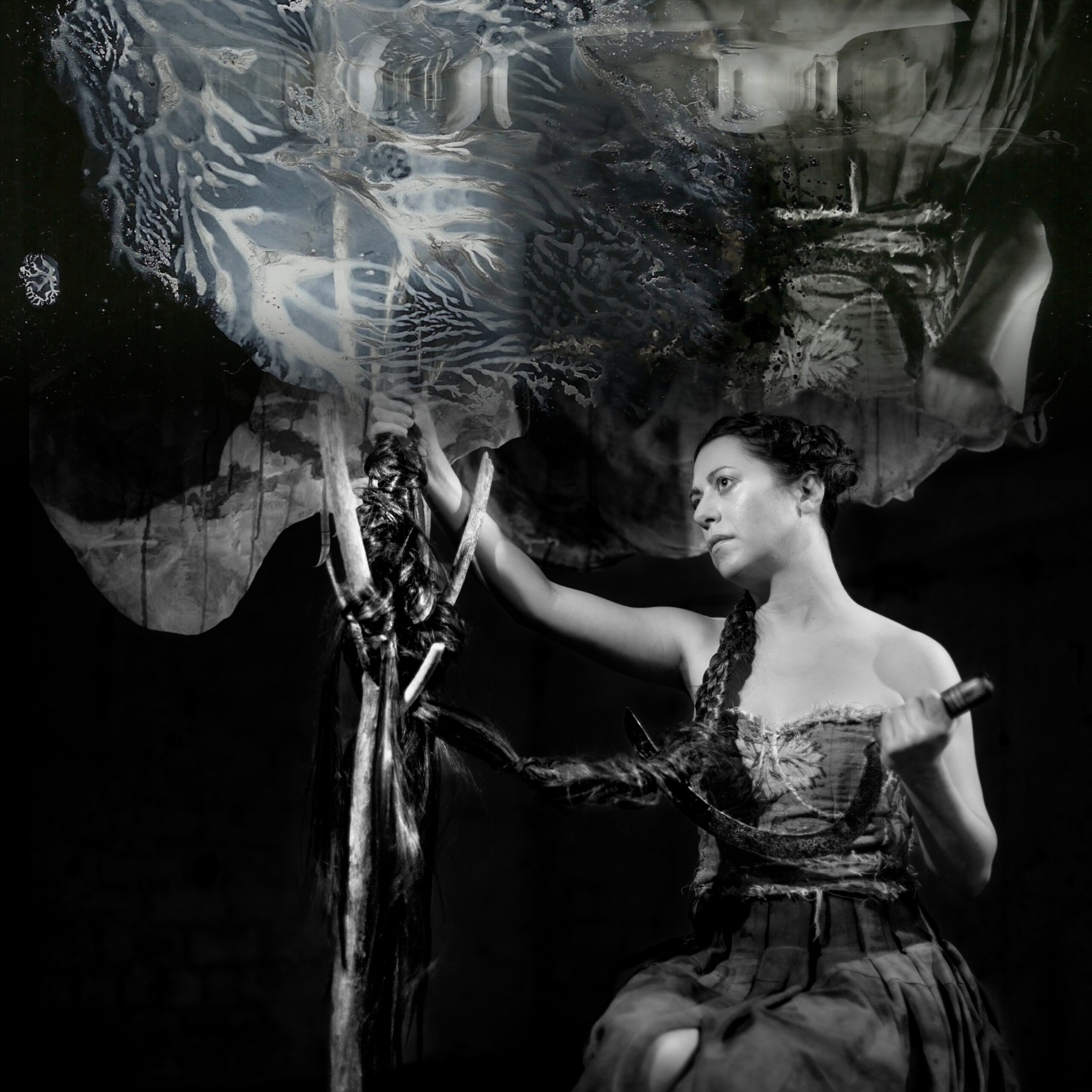
February 20, 2025| Harry Shiels | RELEASE REVIEW

Maud The Moth – The Distaff | Album Review
Inspired by works of Greek poet Erinna of the same name, Maud The Moth returns with new album The Distaff; a raw, unfettered amalgamative exploration of self, individuality, femininity and historic patriarchal expectation that remains a plague to this day.
Experimental/Post-Rock/Ethereal Wave artist Maud The Moth exists as the solo project of Spanish-born and Scotland-based Amaya Lopez-Carromero – also involved as a regular member of healthyliving and collaborator with Scottish avante-garde/progressive black metal collective Ashenspire. Having released and participated in various projects since 2011 debut Home Futile Home, Amaya has used the project of Maud The Moth as an alternate facsimile of themselves, self described as “a séance-like conduit to explore themes of rootlessness, identity and trauma” across their back catalogue. Sitting somewhere between the deeply personal poetry of Emma Ruth Rundle, otherworldly goth touched compositions of AA Williams and elements of the abrasive noise channelling trauma into art of Lingua Ignota. However, these comparisons are relatively surface level as with The Distaff, Maud The Moth establishes herself as unique amongst suggested contemporaries.
The teaser singles offered the perfect insight of what to expect from The Distaff, starting with ‘Siphonophores’. Written in a similar time frame to Healthyliving’s ‘To the Fields’, The Distaff’s first single was reworked to fit the singer/songwriter style, capturing an unnerving feel of a cinematic score during a tense scene. Atmospherics swell and fade, tense textures overwhelm the piano coming to a dramatic stop, before all of a sudden it begins to sourly blossom again. Almost ten minute long ‘Despeñaperros’ starts with haunting, interwoven piano melodies laying a bed for ethereal and breathtaking multi-layered vocal performances. The instrumental swells as the song continues on; adding strings, drums, bass and guitars to the mix for emotive and powerful passages of disquiet and heartbreak in equal measure. ‘Exuviae’ uses samples of bird song alongside dream-like sustained chords broken by industrial scapes and wails. The birdsong pops up at various points in the track alongside some hypnotic instrumentals, Maud’s voice breathes this gentle aura of unease over the screeching sounds and spacious echo of the piano chords. It’s emotionally frail and feels as raw as can with artistic expression, laying her soul to bear calling out into spacious nothing.
Whilst they happily stand on their own two feet as individual singles and giving a good introduction for what to expect, The Distaff is an album experience. The natural flow between the individual compositions is played into, with moments such as the birdsong bridging three tracks; breaking the tense ending of doom/black metal inspired atmospheres within ‘A Temple By The River’, which naturally evolves into a central thematic element in aforementioned ‘Exuviae’ and subtly fades in the emotional submission and intricate piano melodies opening ‘Burial Of The Patriarchs’.
From a production perspective the album sounds phenomenal, being co-produced by Maud The Moth and collaborator Scott McLean (Ashenspire, healthyliving). Mixed in full by McLean, the album was then mastered at Abbey Road by Alex Wharton (Radiohead, My Bloody Valentine, Aurora); achieving a stunning soundscape to get lost in. All tracks were originally composed by Amaya as piano and vocal skeletons, singer songwriter style pieces. Recorded by entirely separating the keyboard from the tail of a grand piano to completely isolate Amaya’s stunning vocal performance. Additional contributions from Seb Rochford (Patti Smith, Sons Of Kemit) on drums, Alison Chesley (Helen Money) on cello, Fay Guiffo on violin and Scott McLean on guitar, saxophone and synths constructed dense, intricate soundscapes balancing a fine line between beauty and esoteric terror.
Use of a vocoder in tracks to alter her voice in captivating ways, where sometimes mystic and aggressive dissonant harmonies, as with album opener ‘Canto De Enramada’ and other’s increasing the layers for the impression there’s a choir as backing vocalists such as with ‘O Rubor’. Lyrically there is no holding back, exploring profound levels of philosophical depths using vibrant imagery and storytelling throughout The Distaff’s run. Whilst birthed from a personal perspective, the album hasn’t got any central narrator; coming together as more a menagerie of snapshots, whispers of personal and historical family traumas. The point being that every track has meticulous detail; within the compositions themselves reflecting the lyrical inspirations or the research levels of depth of meaning behind the storytelling.
The listener is sent on an incorporeal baptism: “throughout the span of one fictional day outside of time and coherent locations and where imagination (often the only account surviving from traumatic events and gaslighting) has become indistinguishable from fact”. Maud the Moth has excelled with The Distaff producing a deep, meaningful and transcendental experience that is hard to liken with anything else. From its opening moments to dramatic finale there is a strong assertion that this is artistic exploration of the rawest kind, making for essential listening.



